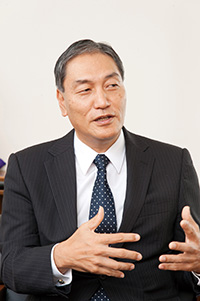Changing our ideas on ICT investment to reflect the business mindset in each country
—Mr. Kurishima, how do you view the ICT industry today?
Among the four NTT DATA internal companies, I oversee the Solutions & Technologies Company. In my daily work, I keep in close contact with our laboratories to keep up with security-related issues and new technologies such as the cloud that are springing up one after another.
I sense that ICT investment in Japan has not been growing much these last few years. As you know, Japan actually experienced negative growth from the time of the bankruptcy of Lehman Brothers in 2008 to the occurrence of the Great East Japan Earthquake in 2011, but in 2012, the economy finally turned back into positive territory. Since then, however, ICT investment has been growing at a rate of only about 1%, and Gartner and other research or advisory firms forecast that it will remain at that level for the time being.
The United States, in contrast, got back on its feet in the year following the Lehman Brothers bankruptcy, and ICT investment there has been growing at an annual rate of 4–5%. Likewise, ICT investment on a global basis has been growing at 4%, and in China, here in the Asia region, it has been growing at a rate of 7–8%. When we compare these figures with those of Japan, we can see that ICT investment here has been somewhat sluggish.
At NTT DATA, we consider ourselves to be a leading company in the ICT industry. And as an industry leader, I feel strongly that it is our responsibility to provide our customers with truly useful ICT services and products that directly benefit their business.
—How did this gap in ICT investment arise?
The fact is, attitudes toward ICT differ between Japan and other countries. Many companies in Japan regard ICT investment as a means of making “back-office” operations more efficient and complete. As a result, about 70% of all ICT investment in Japan is associated with maintenance and management objectives, and the remaining 30% is allocated to the development of new applications and systems that can contribute to revenues. Under these conditions, it is easy for companies to have the preconception that ICT investment incurs costs and that the first thing to do when the economy turns bad is to cut back on such expenses.
In sharp contrast to this approach, companies in the United States and elsewhere invest aggressively in ICT in such areas as e-commerce with the aim of creating new business opportunities and increasing revenues. In addition, ICT investment tends to grow during economic downturns.
There is also a difference between Japan and the United States as to the distribution of system engineers among vendors and customer companies. In Japan, about 80% of all system engineers work on the vendor side, while in the United States, about two-thirds work on the customer side. This seems to reflect a difference in the way that customers themselves approach ICT. In other words, in Japan, product-oriented proposals from the vendor side tend to be the norm, and many of those products are provided for reducing back-office costs rather than enhancing or expanding the customer’s core business.
In the United States, the customer is always thinking about how best to use ICT in business, and it is the customer side that may approach vendors with ideas or suggestions as needed. This way of thinking about developing business is completely opposite that of Japan.
Actually, within NTT DATA itself, a difference can be found in business content between our United States and Japan operations. In Japan, we have a long history of working on social infrastructure systems such as financial and public or government systems, and at present, corporate customers are a surprisingly small market for us. The scale of our business here in Japan also differs from that in the United States, but this difference in approach that we have so far been taking is naturally reflected in business content.
—NTT DATA is doing business in many countries around the world. Is the business strategy that the company adopts in the United States and other countries reflected in its Japan operations? And can the opposite be true?
Yes, certainly. I want to bring together and strengthen the uniqueness and positive features of each company in the NTT DATA Group. For one thing, I believe that we should learn the approach to ICT investment as taken in the United States and elsewhere and make proposals that are directly related to the customer’s line of business. As a leading company, we cannot simply offer technology; it is important that we offer our customers ways to create new business by using new technologies such as big data and the cloud.
To give an example, the Data Warehouse & Business Intelligence Laboratory (DWH/BI Lab), which is part of the Big Data Business Promotion Office that we established last year, asks customers to bring their business data so that they and laboratory staff can analyze it together and apply the results obtained to new marketing plans. I feel that by creating an environment in which NTT DATA staff and customers can come up with new things together, we can affect a change in attitude about ICT investment from one that dwells on costs, to one that emphasizes the creation of new business opportunities. As a specific example, an NTT DATA customer in a retail business had been granting points to consumers in its loyalty program, but they are now working on using the program to analyze market trends and consumer preferences. Consequently, in addition to using such analysis results for their own business, they are also investigating the provision of such information to other companies as a new line of business. Such real-world activities underscore the remarkable progress that is being made in the effective application of big data.
Today, interest is growing in data warehouses and business intelligence, that is, analyzing and processing huge quantities of information accumulated in a company’s business system and using the results of that analysis in corporate decision making. I believe that this kind of service can be extremely effective as an initial approach to transforming our customers’ business endeavors.

Facing the commoditization of ICT with a
revolutionary “co-creation mindset”
—It seems that NTT DATA has not declared cloud services as a main line of business, but what does it mean that cloud technology is part of its management strategy?
To begin with, our primary mission is to optimize our customer’s infrastructure, and to this end, we use the cloud. And while it may be thought that the cloud is simply a means of reducing costs, it also makes system construction relatively easy and enables swift scaling up. In particular, the cloud is indispensable in creating new services together with the customer. When organizations set out to use the cloud, they usually focus attention on techniques for transferring the existing system to the cloud, but this way of thinking stays within the boundaries of cutting costs. Our objective is cloud usage that directly relates to services and new business opportunities.
As ICT professionals, we at NTT DATA have approached development projects so that our customers are comfortable leaving everything to us. In other words, we have been responsible for efficiently and accurately providing highly reliable ICT products and services because ICT is an advanced and sophisticated tool that has not been prevalent throughout society until now. Recently, however, as can be seen from the appearance of 3D (three-dimensional) printers, it is becoming easy for just about anyone to use ICT to make things. I believe that ICT is becoming a familiar part of our lives and that even manufacturing is becoming commoditized! In the face of this trend, it can be said that ICT professionals like ourselves are entering a new phase.
As I mentioned earlier, it is important that our group companies that have bases in countries throughout the world provide essential services and seek out new business opportunities based on the distinctive characteristics of their respective regions. At the same time, seamlessly providing individual key technologies such as the cloud on a global scale is a vitally important issue.
—What efforts are you making to provide technologies on a global scale in a seamless manner?
One approach to achieving this is to make ourselves into a “business model,” and to this end, we have recently adopted “co-creation” as a keyword. This declares our intention to create business opportunities both within the company and in collaboration with our customers. To promote ourselves as a leading company, it is essential that we demonstrate to our customers that we are truly adept at using ICT. To give an example, we have showcased the activities of our ICT department in charge of the company’s back-office operations for our customers to assess.
For our customers, I think that seeing how we ourselves apply ICT in an effective manner can be very persuasive. On the other hand, our own ICT department that we used as a showcase here and which had emphasized only efficiency gains to date, can also develop a good sense of how ICT can be used effectively in a customer’s business by accumulating experience in showcasing in-house ICT solutions.
Customers have also come to us with specific inquiries relating, for example, to cost reduction methods, brand integration with overseas branches, as in establishing a common mail domain, and methods for dealing with globalization. Enabling our customers to visualize our achievements through such a showcase presentation has also helped to motivate NTT DATA employees. It is exactly feedback from our customers that helps us to see what policies and measures we should adopt going forward.
Furthermore, at the Society of Project Management in which I preside as vice-chairman, I give employees of the ICT department opportunities to make presentations, which provides them with stimuli from outside professionals. This can also be quite motivating but in a way that is different from customer evaluations.

Innovation & Japan Quality: Developing the
positive aspects!
—It appears that providing a clear picture of NTT DATA achievements can be very effective. What kind of attitude do you think is needed for people in an organization and the organization itself to grow?
I value an attitude that develops the positive aspects of an organization. Of course, it’s also necessary to make improvements in areas having negative results, but first, I think it’s important to make what is good even better. The foundation of each group company having a presence in countries and regions throughout the world is, in the end, the quality of the technologies and services that we have developed to date. To ensure that this quality becomes rooted in the distinctive business characteristics of each region is an issue to be dealt with. This relates to the idea of making something that is “positive” even better.
Let’s take quality assurance as an example. The high quality of our services is one of our strengths. How to maintain and improve this quality is an issue that I consider to be important. As I’ve mentioned before, the NTT DATA Group covers practically every country in the world. Our overseas sales target is more than 400 billion yen, which accounts for about 30% of total sales.
Going forward, we are entering a stage in which we can think about expanding the entire NTT DATA Group, including its global components. In fact, we are aiming for a domestic-sales-to-overseas-sales ratio of 1-to-1. In addition, we have adopted the slogan “Innovation & Japan Quality” to reflect our objective in becoming a leading company in each region of the world.
I can say with pride that the quality of our services and technologies is high even from a global perspective. Some might say that we are overachieving in the area of quality, but I think that being too good won’t do any harm. Establishing a business while determining how to provide high-quality services at a reasonable price in a trial-and-error fashion is something that we have to work hard at both in Japan and overseas.
—Mr. Kurishima, can you say a few words to all of our researchers supporting these technologies?
I believe that determining how to create “cutting-edge technology” and “the world’s best technology” is an important pursuit. And I would like to see such technology created in collaboration with our customers. This technology, even if considered to be the best in the world, is meaningless if our customers have no use for it. I would truly like to see our researchers produce products together with our customers within today’s market.
—Finally, can you leave us with a message for all NTT DATA employees working around the world?
“Japan Quality” is not something limited to Japan. To enhance Japan Quality even further, the technologies and services that we have come to refine and nurture in the countries where NTT DATA has bases must be brought together. In this sense, I would like to ask all of our employees throughout the world to adopt a “co-creation mindset” within the company.


